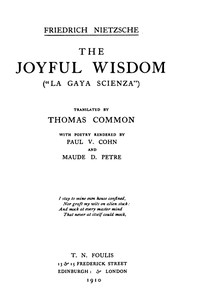The Joyful Wisdom ("La Gaya Scienza") by Friedrich Wilhelm Nietzsche
"The Joyful Wisdom" by Friedrich Wilhelm Nietzsche is a philosophical treatise written in the late 19th century. The work explores themes of life, laughter, morality, and the human condition, attempting to reconcile the often painful realities of existence with a joyful acceptance of life itself. Nietzsche's distinctive voice and provocative ideas challenge conventional beliefs, positioning him as a significant figure in existential thought. The opening of "The Joyful Wisdom" establishes the groundwork
for Nietzsche's exploration of happiness and human experience. He introduces the concept of "joyful wisdom" as a playful yet profound response to life's trials, reflecting on ideas of health and convalescence, and suggesting that genuine wisdom can emerge from suffering. Nietzsche emphasizes the importance of questioning existing moral frameworks while advocating for a new understanding of life that embraces both its joyous and tragic elements. He suggests that humor and lightness are essential tools in navigating existence, setting the stage for a critical examination of conventional beliefs about morality, suffering, and happiness throughout the text. (This is an automatically generated summary.)
Read now or download (free!)
| Choose how to read this book | Url | Size | ||||
|---|---|---|---|---|---|---|
| Read online (web) | https://www.gutenberg.org/ebooks/52124.html.images | 585 kB | ||||
| EPUB3 (E-readers incl. Send-to-Kindle) | https://www.gutenberg.org/ebooks/52124.epub3.images | 274 kB | ||||
| EPUB (older E-readers) | https://www.gutenberg.org/ebooks/52124.epub.images | 279 kB | ||||
| EPUB (no images, older E-readers) | https://www.gutenberg.org/ebooks/52124.epub.noimages | 270 kB | ||||
| Kindle | https://www.gutenberg.org/ebooks/52124.kf8.images | 453 kB | ||||
| older Kindles | https://www.gutenberg.org/ebooks/52124.kindle.images | 394 kB | ||||
| Plain Text UTF-8 | https://www.gutenberg.org/ebooks/52124.txt.utf-8 | 525 kB | ||||
| Download HTML (zip) | https://www.gutenberg.org/cache/epub/52124/pg52124-h.zip | 254 kB | ||||
| There may be more files related to this item. | ||||||
Similar Books
About this eBook
| Author | Nietzsche, Friedrich Wilhelm, 1844-1900 |
|---|---|
| Editor | Levy, Oscar, 1867-1946 |
| Translator | Cohn, Paul V. (Paul Victor) |
| Translator | Common, Thomas, 1850-1919 |
| Translator | Petre, Maude Dominica, 1863-1942 |
| Uniform Title | Fröhliche Wissenschaft. English |
| Title |
The Joyful Wisdom ("La Gaya Scienza") Complete Works, Volume Ten |
| Note | Reading ease score: 52.6 (10th to 12th grade). Somewhat difficult to read. |
| Credits | Produced by Marc D'Hooghe (Images generously made available by the Hathi Trust.) |
| Language | English |
| LoC Class | B: Philosophy, Psychology, Religion |
| Subject | Philosophy |
| Category | Text |
| EBook-No. | 52124 |
| Release Date | May 22, 2016 |
| Most Recently Updated | Apr 2, 2024 |
| Copyright Status | Public domain in the USA. |
| Downloads | 652 downloads in the last 30 days. |
| Project Gutenberg eBooks are always free! | |

